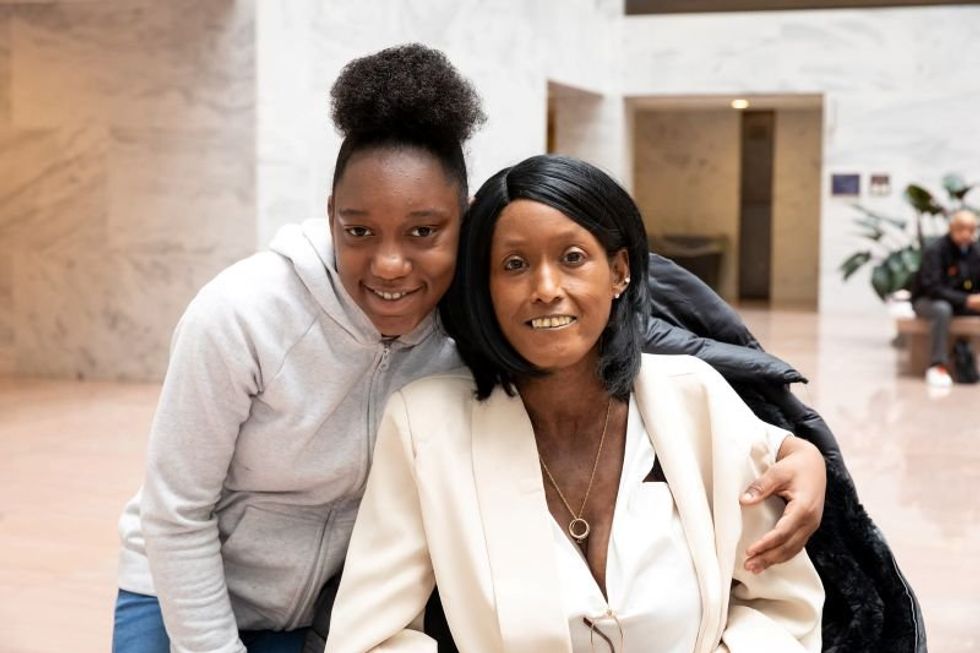As told to Nicole Audrey Spector
One day in 2023, I went for a walk. Just a simple walk. No biggie. When I got home, I was coughing. I was terrified that I had Covid. My terror was largely rooted in the fact that I have scleroderma. I was diagnosed in 2001, at the age of 19. Living with a chronic autoimmune disease like scleroderma makes you high-risk. Covid, I knew, could kill me.
That night, I slept outside in the warm summer air. Along with coughing, I was having difficulty breathing and felt like I was being smothered, but the fresh, gentle air helped me breathe better.
The next day, my symptoms were just as bad. My husband was worried I was worsening and would need to go on a ventilator. So I went to the hospital.
I tested negative for Covid, but I was promptly admitted and underwent a pulmonary function test, an echocardiogram and blood testing. All this revealed I’d just had two heart attacks. The heart attacks, my healthcare providers (HCPs) concluded, were caused by chronic obstructive pulmonary disease (COPD). I knew I had interstitial lung disease — inflammation and scarring of the lung tissue — caused by the scleroderma. I’d been living with that for about a year. But COPD was a totally new diagnosis.
What had happened, the HCPs said, is that the COPD — caused by the scleroderma — had triggered a scleroderma flare, which then triggered my heart arteries to block themselves. Additionally, my throat closed up. I could hardly swallow. Not even a pill.
I was in the hospital for six weeks. Stents were put in my heart to open arteries. I underwent throat stretching to widen my esophagus. I was also given breathing treatments and medications to manage the symptoms of COPD.
One of the best things I did while in the hospital was phone my good friend, another scleroderma survivor, every day. I called her when the HCPs came in to do their rounds. I put her on speakerphone so she could hear everything. I don’t feel super confident in my ability to understand medical jargon, especially when I’m the subject of all the talk. This dear friend would listen to what my HCPs were saying, and then, once they left, break it all down for me in a way that didn’t feel confusing. She was my own personal patient advocate, and I recommend that anyone feeling overwhelmed while navigating an illness have someone like her on board.
My husband and child, 12 at the time, were so worried that I’d die. I was afraid, too. I’d already been through so much with scleroderma, including multiple amputations. A lot of people who have endured as much damage from this disease as I have don’t live much longer.
But honestly, when I went through this COPD crisis, I was almost more stressed than scared. My life is incredibly busy. I’m a mom, I run a company, I work as a mentor, and I’m immersed in chronic illness advocacy work. I travel often and am always juggling a million different things. Having to step away from my many projects to deal with all this really set me back and made me feel like I was letting everyone down.

Once I got home from the hospital, I didn’t really know what my future would look like or how life would change now that I was living with COPD, which, like scleroderma, has no cure. But I got the hang of it all pretty quickly. (Fortunately, my symptoms are under control with breathing treatments and medications.) I started doing research to better understand the disease and how to best live with it. Now, I’m a passionate advocate for people living with COPD and do a tremendous amount of work in the COPD community.
Today, I’m as busy as ever, but my illnesses are taking a toll on my body. It’s starting to look like I won’t be able to travel nearly as much as I used to, if at all. I’m not thrilled about that, but I’m also not angry. My advocacy work makes me part of something so much bigger than myself. I feel that it’s what I was meant to do. I’ve watched so many friends die — some in much better physical condition than me. I don’t take a moment of my time here for granted.
Yes, I’m sick — as is everyone else living with COPD. But being sick doesn’t mean you have to be sad. And it doesn’t mean you have to be alone. Absolutely not. A major problem I see in the COPD community is people who have it not reaching out for support. I see too many people just sort of disappear in the disease. I hope to see more of us open our minds and eyes to see that there are entire organizations dedicated to helping people with COPD. So many resources are just a Google search away.
We’re all stronger than we think we are, and this is perhaps most true for women. We can get through pretty much anything if we accept it. If you’re living with COPD — or any chronic illness — I welcome you not to see it as a death sentence but as a new journey. And there are so many of us here to walk this journey with you.
This educational resource was created in partnership with COPD Foundation and with support from GlaxoSmithKline, Regeneron and Sanofi.
Have a Real Women, Real Stories of your own you want to share? Let us know.
Our Real Women, Real Stories are the authentic experiences of real-life women. The views, opinions and experiences shared in these stories are not endorsed by HealthyWomen and do not necessarily reflect the official policy or position of HealthyWomen.
From Your Site Articles
Related Articles Around the Web




